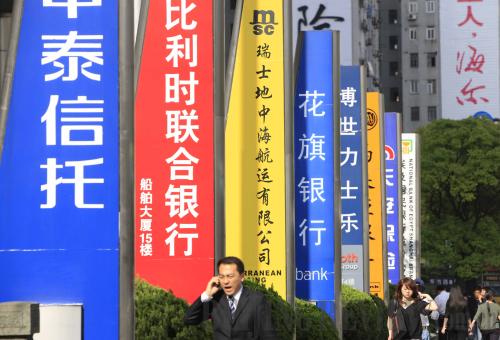|
 |
|
FLEXING FINANCIAL MUSCLE: Pedestrians walk through the Lujiazui financial street in Shanghai. China will need to shore up its service sector, especially the financial industry (PEI XIN) |
In my opinion, there are four keys to making China's successful economic rebalancing.
First, China must build an innovative society. Learning lessons from past global crises, new industries have always been a strong perk to lift the world economy out of quagmire. That means we need to focus on technological innovation and inject fresh steam into the economy. We should develop the environmentally friendly and hi-tech industries, which could create high added value and more jobs. Efforts are also needed to deepen reform in education, to foster more innovative talents.
Second, China must attach importance to the service sector. One weak link to the Chinese economy is the service industry. In recent years China has been running a significant amount of deficit in the services trade, compared with a surplus in general foreign trade. Meanwhile, the reason that developed countries have been able to be engaged in high-end production is also in their strong service industries.
China should take a step-by-step approach to developing its service industry and emphasize modern services like finance, insurance, modern logistics, project consulting, accounting and legal services. The financial industry, in particular, deserves vigorous efforts. In addition, it is necessary for the country to further improve its market entrance and accounting systems, and provide a better environment for the financial industry to grow.
As part of its efforts to buck up the financial sector, China should press ahead with internationalization of its currency, the yuan.
Efforts to extend the global reach of the yuan are already underway. China has put in place a trial program to promote yuan settlement in cross-border trade and issued yuan-denominated bonds in Hong Kong. China has also signed a series of currency swap agreements with many countries and launched the QFII (qualified foreign institutional investor) scheme, which allow foreign intuitions to invest in the domestic stock markets. In 2009, the country inked a deal with the IMF to use the yuan, instead of U.S. dollars, to purchase IMF notes. (In its latest move, China's central bank in January 2011 launched a trial program to allow qualified enterprises to settle their overseas direct investments in the yuan.)
So what's the next step? China still has a lot to do to boost the status of its currency, including bolstering the proportion of the yuan in global reserve currencies, increasing its activities in international foreign exchange markets, enhancing its presence in international trade settlement and its role in global investments, bond issuance, international aid and foreign exchange risk management.
For the yuan to become an international currency, it should draw more strength from at home. As a result, China still needs to reinforce marketization of the interest rate, develop depth and flexibility of the domestic financial markets, further open up the capital accounts under the balance of international payment and increase convertibility of the yuan.
Third, China must propel industrialization, urbanization and modern agriculture. Without an advanced agricultural sector, China cannot accomplish real modernization, and worse still, the country would have to suffer a widening income gap between rural and urban residents and a worsening Gini coefficient as urbanization accelerates. And a shaky agricultural foundation may put China in the "middle income trap"—a concept that the strategies taken by a country to grow from low income to middle income are not enough to make them enter into the high-income group.
In response, China needs to remove the social system barriers between cities and the countryside. Efforts are also required to ensure reasonable allocation of public resources and spur free movement of production resources between urban and rural areas. It would also help if China could beef up integration of rural and urban infrastructure construction, public services and social management.
Fourth, China should play an active role in the G20, the international monetary system reform, promoting free trade, fighting protectionism in any form and pushing forward the reform of other international regulations and enhancing cooperation. The old world economic architecture relied on major international organizations, including the IMF and the World Bank, but those organizations turned out to be less capable of tackling the financial crisis and ensuring a greater representation of emerging economies.
The world still has a long way to go before substantial reform to the world monetary system is realized. Regional financial and monetary cooperation is key to the reform. At the very least, China should participate in repairs to that system, and seriously deal with regional financial and monetary cooperation. | 